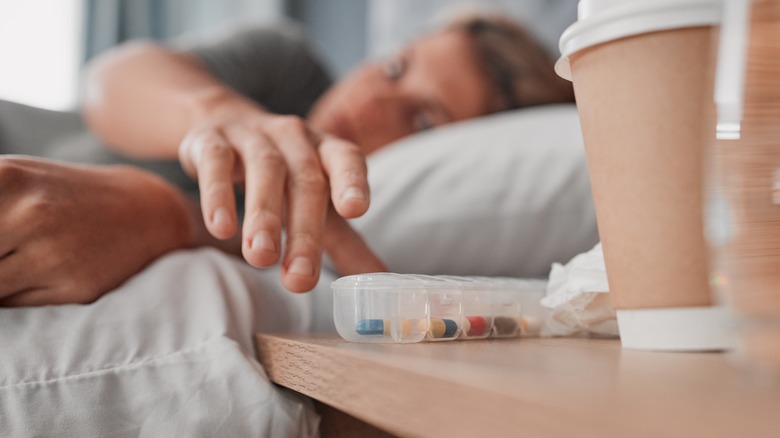The Popular Sleep Medication You Should Avoid Taking With Coffee At All Costs
Not everyone can switch off devices, get in a bubble bath, listen to relaxing music, and naturally drift off to sleep. For some people, nodding off is an effort. As a result, medications can be one of the ways they get the quality sleep they're after.
One particular sleep-related supplement that's become increasingly popular is melatonin, also known as the sleep hormone. While some sleep experts insist that your body produces enough melatonin by itself to help with sleep, science has also looked into the effects of short-term melatonin supplementation to get the job done. Particularly in the case of sleep disorders or age-related decrease of natural melatonin production, this sleep aid could come in handy. Melatonin is also a supplement people turn to when they're flying across different time zones or if they're dealing with shift work-related sleeplessness. By taking the supplement, you're essentially adding to the supply of melatonin already in your system.
However, if you've already gotten in the habit of chewing melatonin gummies or popping a pill before bedtime, you don't want to be mixing the stuff with coffee. Coffee and melatonin have contrasting effects. Consuming coffee will cancel out whatever sleep-related benefits you're looking to achieve with the popular sleep medication. Let us explain.
Coffee is a stimulant while melatonin prepares you for sleep
There's a reason why coffee has been classically touted as a morning pick-me-up beverage. It jolts your system awake. "Caffeine works by blocking sleep-promoting receptors in your brain called adenosine receptors. It can do this because, structurally, caffeine looks very similar to adenosine, the molecule that usually binds to these receptors," primary care physician Dr. Rashad Ramkissoon of Houston Methodist explained to the hospital's blog.
Melatonin does the opposite to your system. Produced naturally by our brain's pineal gland, melatonin is a hormone that works in conjunction with your circadian rhythm to let you know when it's time for bed. It's produced in higher quantities at night in response to darkness, and its levels decrease when the sunlight comes streaming through your windows in the morning. According to a 2013 meta-analysis of 19 separate studies published in PLUS One, melatonin supplementation was found to be effective when it came to reducing sleep onset latency, boosting total sleep time, and improving overall sleep quality in adults and children diagnosed with primary sleep disorders.
If you consume caffeine at the same time as this sleep medication, however, it can inhibit the metabolism of melatonin in your body, according to a 2020 study published in BioMed Research International. In fact, caffeine is thought to decrease melatonin levels in your system. Now you might be wondering — who would consume coffee before bed if they're already on melatonin pills to help them fall asleep? This is where timing could become a concern.
Coffee vs. melatonin: What's the best time to consume them?
While experts maintain that people will metabolize coffee differently based on such factors like genes, overall consumption of coffee, caffeine tolerance, etc., the general thought is that caffeine can remain in your system for up to six hours after you've consumed the stuff. So yes, timing could matter.
If you have a standard bedtime — let's say 10 p.m. — the recommendation is to not consume caffeine after 2, 3, or, at latest, 4 p.m. during the day. You may want to think about your green tea and regular tea consumption too. Although coffee has a higher caffeine concentration than both, again, caffeinated tea could affect people in different ways.
As for your melatonin tablets, when should you take them? Yo-El Ju, a neurologist and sleep medicine specialist at Washington University in St. Louis, told CNBC that this might also depend on the person and their particular sleep problems. "For people who have a problem with their internal clocks, if they have a circadian disorder, like a night owl type, we will recommend that those individuals take melatonin about an hour or two before their desired bedtime," explained the expert. For those who don't have a circadian disorder, 15 minutes before bedtime would suffice, added Dr. Ju.
Lots of different medications have negative interactions with coffee. It's important to know about these before taking any pills or supplements.


